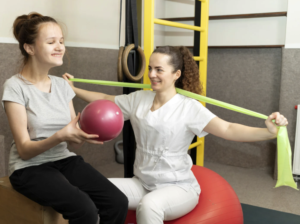There are tons of options for toys that your child can play with to encourage speech and language, and you likely already have some you can use. Remember that you want to give your child opportunities to talk, and you want to give yourself opportunities to model language. Language is all about interacting with another person, so you can use toys, but the toy is not what will help your child talk; you are. That being said, some toys make it easier for you than others.
Read more for tips on how to help your child’s speech and language!
4. Toys that encourage imaginative play
These are toys that you can do a lot of different things with–think blocks, coloring, or dolls. Anything you have to make up a game for is great, especially for children who are working on things like play skills, social skills, or problem solving.
5. Something you already do every day
Keep in mind that kids learn language through everything they do, not just through playing with specific toys. Talk about everything you’re doing all day, which will help them increase their vocabulary, hear models of good speech, and improve their language.
6. Songs
Singing is a great way to engage in a routine with your child, pass the time, and keep your child’s attention, while also learning some new vocabulary and having fun. Plus, songs are free!
7. Books, books, books
Read to your child! This has the added advantage of working on some reading skills as well, so as they learn to read they will already have a good foundation. Talk about the story, make up rhymes, retell it in your own words, ask and answer questions, explain new words, act it out – book reading gives so many options for language and play, and according to Wasik and Alice (2001), the more you interact with the book, the more your child will learn.
As a general rule, look for toys that require lots of interaction–from you, from your child, and with the toy. Take your time, give your child plenty of chances to respond but don’t demand a response, and have fun. If you feel tired, happy, and bonded after playing with your child, you probably helped their speech and language.
References:
Weisberg, D. S.; Zosh, J. M., Hirsh-Pasek, K., Michnick, R. (2013). Talking it up: play, language development, and the role of adult support. American Journal of Play, 6(1), 39-54.
Wasik, B. A., Alice, M. (2001). Beyond the pages of a book: interactive book reading and language development in preschool classrooms. Journal of Educational Psychology, 93(2), 243-250.
If you or a loved one is in need of physical, occupational, or speech therapy please call our front office at 586-323-2957 to schedule your FREE 30 minute screening.
Written by: Kerry Symes, M.A., CF-SLP



